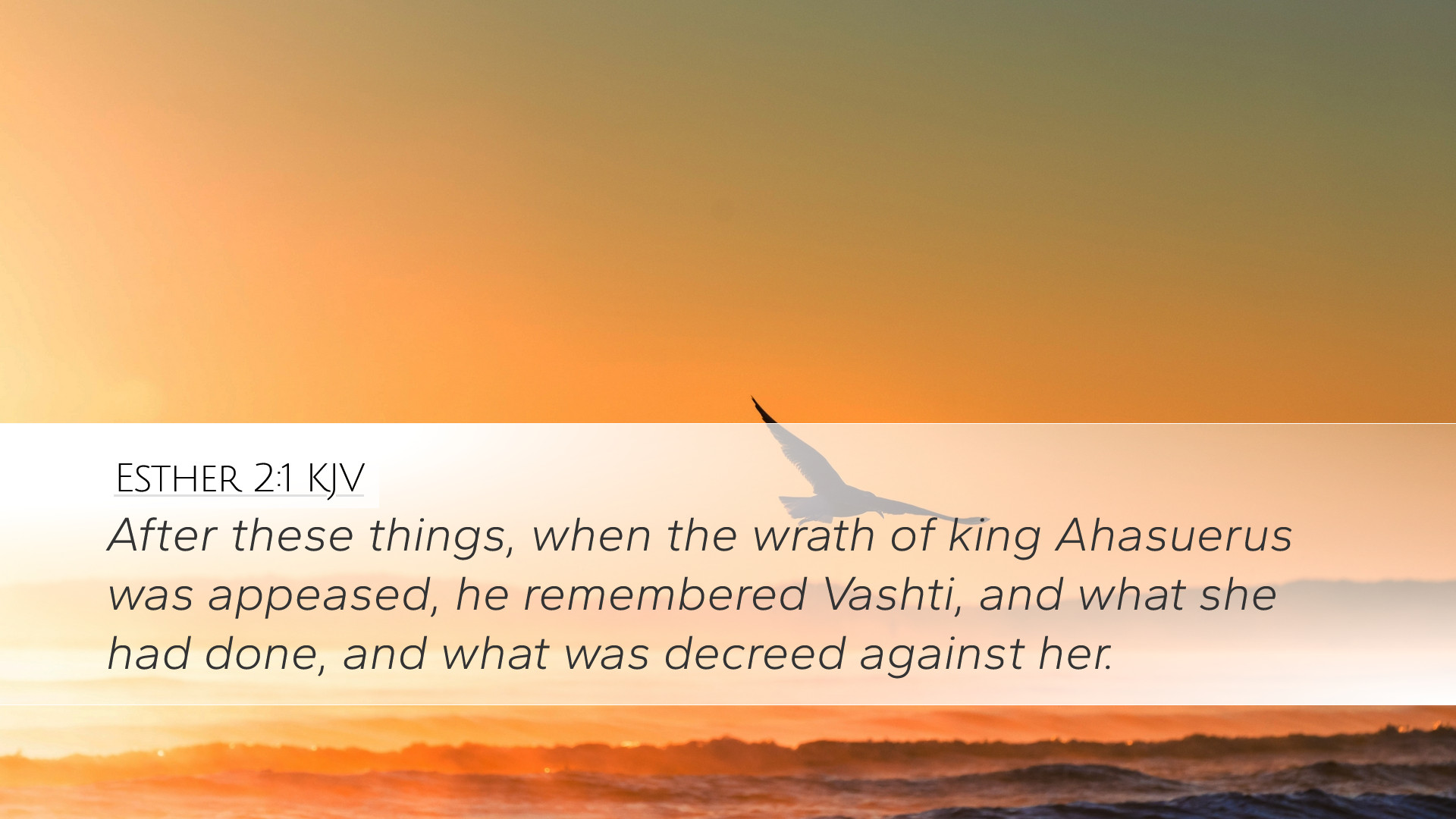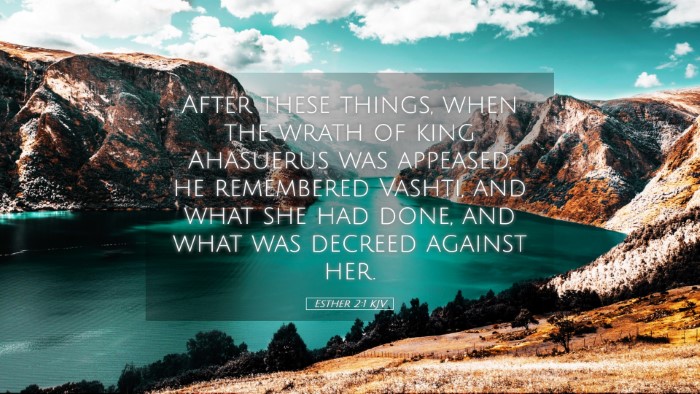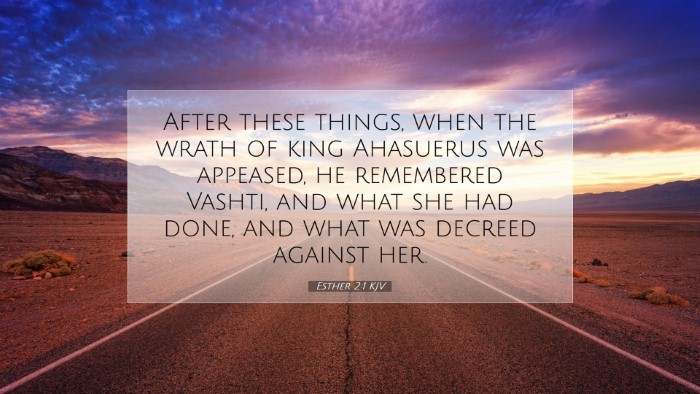Old Testament
Genesis Exodus Leviticus Numbers Deuteronomy Joshua Judges Ruth 1 Samuel 2 Samuel 1 Kings 2 Kings 1 Chronicles 2 Chronicles Ezra Nehemiah Esther Job Psalms Proverbs Ecclesiastes Song of Solomon Isaiah Jeremiah Lamentations Ezekiel Daniel Hosea Joel Amos Obadiah Jonah Micah Nahum Habakkuk Zephaniah Haggai Zechariah MalachiEsther 2:1
Esther 2:1 KJV
After these things, when the wrath of king Ahasuerus was appeased, he remembered Vashti, and what she had done, and what was decreed against her.
Esther 2:1 Bible Commentary
Commentary on Esther 2:1
Bible Verse: "After these things, when the wrath of King Ahasuerus was appeased, he remembered Vashti, and what she had done, and what was decreed against her."
Context and Significance
The opening verse of Esther 2 sets the stage for a crucial turning point in the narrative of the book of Esther. The phrase "after these things" refers to the events that surrounded the king's tumultuous reaction to Queen Vashti's defiance in chapter 1. This context is essential as it illustrates the volatile nature of Ahasuerus's rule and the societal norms surrounding kingship and queenship in ancient Persia.
Insights from Commentaries
1. Matthew Henry's Commentary
Henry elucidates the psychological dimension of Ahasuerus's character. He observes that after the king's anger subsided, he began to reflect upon Vashti's actions. Henry writes, "He remembered Vashti, not only what she had done but the prudent yet disobedient stance she took. His contemplation signifies a possible regret for having dismissed her so hastily."
Moreover, Henry notes that the king's eventual need for a new queen indicates a deeper void left by Vashti's absence. This event illustrates a broader theme of divine sovereignty, as God's providence operates through the circumstances of Ahasuerus and the unfolding events leading to Esther's rise.
2. Albert Barnes' Notes on the Bible
Barnes emphasizes the ramifications of Vashti's removal from the throne. He suggests that her fate serves as a cautionary tale for those who dare defy royal authority. "Vashti's disobedience led not only to her downfall but also to a series of events that would ultimately reflect God's providential control over the affairs of men." Barnes points out that the king's remembering Vashti highlights how the past can linger in the decisions of leaders.
Furthermore, Barnes discusses the implications of the king's reflection on Vashti's actions as an indicator of the shifting power dynamics within the Persian court. The potential for replacing Vashti sets forth a narrative of vulnerability and opportunity in the lives of other women in the kingdom, namely Esther.
3. Adam Clarke's Commentary
Clarke provides a more detailed analysis of the sociocultural implications of the king's actions. He states, "The king was under the influence of the grandees of the kingdom, and the whimsy of councilors often determined royal decrees. Vashti’s refusal publically highlighted the tensions between authority and autonomy, and her being remembered by Ahasuerus illustrates a conflict between personal emotions and political necessity."
Clarke's commentary reveals that Ahasuerus's reminiscence of Vashti is both personal and political. It reflects the complexities of leadership in a patriarchal society, especially one fraught with rigid gender roles.
Theological Implications
This verse brings forth significant theological themes, especially regarding the sovereignty of God and human agency. The recapitulation of events hints at a divine orchestration behind the scenes. Throughout the book of Esther, God's name is never directly mentioned, yet His presence is palpably felt through human decisions and actions.
- Divine Providence: This moment in Esther 2:1 serves to point out how God’s providence can work through the flaws and failures of human decisions.
- Leadership and Responsibility: Ahasuerus embodies the challenge of leadership, where decisions have immediate and lasting impacts on individuals’ lives.
- The Role of Women: Vashti’s actions open a discourse on the role of women within the context of power. Her strength in disobedience sets the stage for Esther's rise, showing how one woman's boldness can pave the way for another.
Application for Today
The events depicted in Esther 2:1 resonate with contemporary issues surrounding authority, gender roles, and the complexities of human relationships. Pastors and theologians can draw parallels between Ahasuerus's emotional landscape and the challenges leaders face in acknowledging the consequences of their decisions. In a world where the balance of power often shifts, this narrative invites reflection on how individuals can assert their values and beliefs in the face of authority.
Students and scholars may find inspiration in the contrast between Vashti and Esther. Both women exemplify different responses to the patriarchal structures around them. One may choose to resist, while the other navigates the complex expectations of court life. Both narratives are deeply meaningful in understanding gender dynamics and the biblical portrayal of women.
Conclusion
Esther 2:1 is not merely a transitional verse; it encapsulates critical themes of remembrance, consequence, and the interplay of personal and political dynamics. As we glean insights from the reflections of ancient commentators, we are reminded of the timeless nature of Scripture and its relevance across generations. Emphasizing God's unseen hand, we can see how His providence persists amidst human failure and triumph.


